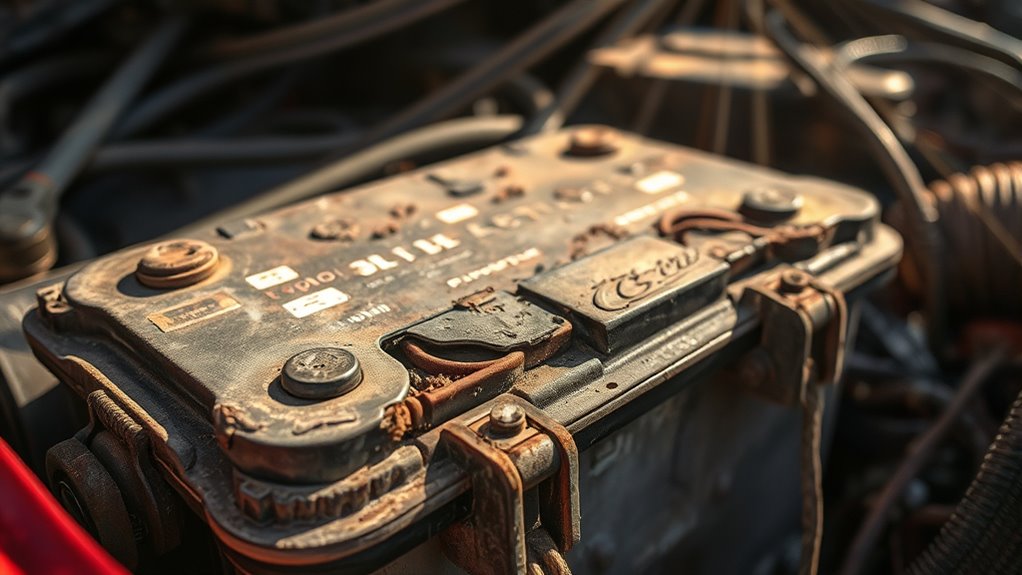Extreme heat speeds up your car battery’s wear by increasing internal chemical reactions and causing corrosion, which hampers electrical flow. This leads to sluggish starts and can shorten your battery’s lifespan. To fight back, keep your cooling system in check, park in shady spots, inspect and clean terminals regularly, apply anti-corrosion protectants, and ensure your battery stays secure. Staying proactive helps your battery last longer—more tips on how to safeguard your battery come next.
Key Takeaways
- Extreme heat accelerates internal chemical reactions, causing faster battery wear and increased corrosion.
- Corrosion deposits on terminals hinder electrical flow, leading to sluggish starts or failure.
- High temperatures weaken battery components, reducing lifespan from the typical 3-5 years.
- Proper cooling system maintenance prevents excessive engine heat that damages the battery.
- Protecting the battery by parking in shaded areas, inspecting terminals, and cleaning corrosion extends its life.

Extreme heat can markedly impact your car’s battery performance and lifespan. When temperatures soar, your battery faces increased stress, which accelerates wear and can lead to unexpected failures. One of the key issues is battery corrosion, which becomes more prevalent in hot conditions. As the engine runs hotter, the chemical reactions inside the battery accelerate, causing the terminals to corrode faster. Corrosion creates a barrier that hampers electrical flow, making it harder for your battery to deliver the power needed to start your car. Over time, this corrosion can lead to poor connections, resulting in sluggish starts or even complete battery failure.
Extreme heat accelerates battery corrosion, causing poor performance and potential failure.
To combat this, maintaining a proper cooling system is essential. Your vehicle’s cooling system helps regulate engine temperatures, preventing excessive heat buildup that can indirectly harm the battery. When your cooling system functions effectively, it keeps the engine and surrounding components, including the battery, at ideal temperatures. Regularly checking and topping off coolant levels, inspecting hoses for leaks, and ensuring your radiator is clean can help keep your engine cool and reduce the heat stress on your battery. A well-maintained cooling system doesn’t just protect your engine; it also prolongs the health of your battery, especially during those sweltering summer months.
Aside from corrosion and cooling system maintenance, there are practical steps you can take to protect your battery from extreme heat. Parking in shaded areas or garages minimizes direct sun exposure, which can cause the battery and other engine components to heat up unnecessarily. You should also regularly inspect your battery terminals for signs of corrosion—white, ashy deposits are a clear indicator—and clean them with a mixture of baking soda and water if needed. Applying a terminal protectant or anti-corrosion spray can also help prevent future buildup. Additionally, ensuring your battery is securely mounted prevents vibrations that could loosen connections or cause internal damage.
Finally, keep an eye on your battery’s age. Most batteries last around three to five years, but extreme heat can shorten this lifespan. If your vehicle is showing signs of sluggish starts or dimming headlights, it might be time to get a professional check-up or replace the battery before it leaves you stranded. By staying proactive—maintaining your cooling system, preventing corrosion, and taking simple protective measures—you can greatly extend your battery’s life and ensure your car remains reliable, even during the hottest days. Recognizing the importance of projector technology and proper maintenance can help you avoid unexpected breakdowns and keep your vehicle running smoothly in all conditions.
Frequently Asked Questions
How Long Does a Car Battery Last in Extreme Heat?
Your car battery’s lifespan can drop markedly in extreme heat, usually lasting about 3 to 5 years instead of the typical 4 to 6. Heat impacts your battery by accelerating fluid evaporation and causing internal damage, which shortens its overall life. To fight back, you should regularly check the battery’s health, keep it cool, and ensure proper maintenance. Taking these steps helps extend your battery’s lifespan despite the heat.
Does Humidity Affect Battery Performance in Hot Weather?
Think of humidity like a damp sponge, steadily soaking into your car’s battery. Moisture impacts performance by increasing corrosion risk, which can weaken battery connections and reduce lifespan. In hot weather, high humidity accelerates these effects, leading to potential failures. You should regularly check for corrosion and keep terminals clean. By controlling moisture and protecting against corrosion, you can help your battery survive the heat and stay reliable longer.
Can a Car Battery Be Overcharged During Heatwaves?
During heatwaves, your car battery can indeed be overcharged if the charging system isn’t properly regulated. Overcharging risks damage to the battery’s internal components and reduces its lifespan. High temperatures interfere with the vehicle’s temperature regulation, making it vital to monitor your battery and charging system closely. Keep an eye on warning signs and guarantee your car’s electrical system is maintained, preventing overcharging and extending your battery’s life.
What’s the Best Time to Check Battery Health in Summer?
Imagine catching your car’s health at just the right moment—there’s an ideal timing for battery testing during summer. You should check your battery early in the morning or late in the evening when temperatures are cooler, which helps guarantee accurate results. Regular inspections, especially before heat peaks, keep your battery in top shape. This way, you’re proactively safeguarding your vehicle’s power and avoiding unexpected breakdowns during scorching days.
Are There Specific Battery Types Better Suited for Hot Climates?
In hot climates, you should look for batteries with advanced battery chemistry, like AGM or calcium-calcium, which resist heat better. These types often have superior thermal management, helping them stay cool and last longer. Choosing a battery designed for high temperatures can reduce the risk of overheating and failure. Always check the manufacturer’s specs to make sure it’s suited for extreme heat, keeping your car reliable in scorching conditions.
Conclusion
Extreme heat can cause your car battery’s internal components to break down faster, leaving you stranded. Did you know that temperatures above 95°F can reduce a battery’s lifespan by up to 20%? To protect your investment, park in the shade, check your battery regularly, and consider using a battery insulation kit. Taking these steps now means you’re less likely to face unexpected breakdowns when you need your car the most. Stay cool and keep your battery healthy!










